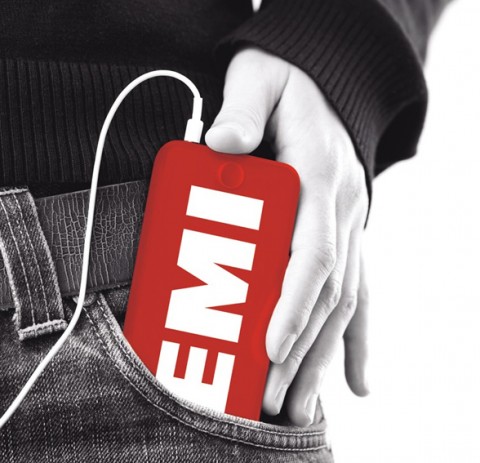
Two
years ago I wrote a feature on the first-ever stateside Music Hack Day. It
was a rad occasion, not to mention an introduction to the way that
I'd be finding and listening to tunes from that day forward. Because
of that weekend and subsequent opportunities that I've had to cover
the future of music, I can honestly say that I know more about what's
coming down the wire than most Web pedestrians and even some tech
writers (at least the shitty ones, I suppose).
But
while the fan and computer worlds come around, it's hard to ignore
the continuing absence of some major stakeholders. Indeed this was
the focus of my early coverage, in which I wrote: “Considering how
executives continue to defend dated hard-distribution models as their
businesses implode, it's hardly a surprise to watch them miss the
train. After all, tech mavens have long alleged that industry fat
cats would rather toast past successes than discover how invention
propels multimedia.”

On
that note it was interesting to see the introduction of EMI to the
equation. Though Hack Day is philosophically a “business-free
zone,” the ultimate goal of events like this – and in the new
music revolution in general – is to synthesize the commercial and
technological sides of things, so that artists get paid and fans are
satisfied. If major labels that own thick slices of the international
songbook also get a cut, then so be it. But in the meantime problem
solvers need to work together.
All of
which is why it's only natural that the Echo Nest continues to host
the annual powwow of music technology's most gifted hackers. The
Somerville-based company is the undisputed leader in connecting
independent developers with license holders, marketers, and everybody
else needed to power sweet developments. They're responsible for more
premier apps than you can imagine, from the MTV Music Meter to
Discovr, Groovebug, and Pocket Hipster.
Echo
Nest has been working with EMI to give developers access to select
parts of their catalogue (including the entire Blue Note collection).
The commercial possibilities are endless: Gorillaz remix apps, a
Chiddy Bang frat house jukebox, Pet Shop Boys meme generators
(or course artists would have to agree with ideas). With that said, EMI
provided just some options for this weekend's wizards and code
warriors, all of whom had a number of tricks in their toolboxes.

For
outsiders, here's a quick pedestrian take on how Music Hack Day
works: developers come up with app ideas, then hack them together by
employing any number of Application Programming Interfaces (APIs)
that can provide the content needed. For example: if an app needs
tour or ticket info, then they might use the Ticketfly API. If the idea relies
on knowing everything about a song – including how popular it is
online – then they'll probably tap into the Echo Nest's Musical
Brain.
So who
came to play nice and network (and to chill with Ali Shadeed Muhammad
at the afterparty)? There were scoring and composition assistants
like Noteflight and Musescore, the latter of which makes it possible
to render sheet music on your iPhone. Then there were powerhouses
like Rovi, which has swallowed, among other companies, TV Guide and
AllMusic in their mission to provide comprehensive bio info to the
likes of Last.fm and iTunes.
I'm
also digging Twilio, which allows you to corporate voice and SMS to
any app, and OpenTok, which performs a similar function for those
looking to weave in live chat and video. Then there's location-based
audio pegging through Shoudio, the increasingly indispensable
SoundCloud, the Questlove-endorsed Swift.fm multi-network sharing
tool, and Nimbit, which recently re-launched as a commerce device
that allows for new and dynamic ways to push merch and music online.

By the
end of Hack Day weekend, a score of fascinating apps had materialized
in some rudimentary or beta form. Some – like the simple trendy
Mustachiness, which, you guessed it, grooms a virtual 'stache out of peak
loudness waves from your favorite songs – will probably drop soon
(that one in particular if proceeds are really going to Movember).
Others, like the awesome group-source party playlist enabler Spartify,
are also already running and will likely hit app stores shortly.
There
were too many fresh hacks to mention (check the whole list
here), but especially worth noting are: the Rovi Christmas Findr, which can
recommend obscure holiday tunes that don't completely suck; the
self-explanatory Music Bloodline; poptoaster, which allows you to
upload MP3s and play Name That Tune on Facebook with your geeky
friends. Plus there are the Best in Show winners – Unity-echonest and
MidiSyncher – and the oh-so-clever Drinkify, as in “I'm listening to Wu-Tang –
what should I drink?”

Many of these inventions are pie in the sky - and are in some cases so arcane that few
consumers would really actually them. But that's the furthest thing from the
point, as Hack Day is first and foremost a venue for promoting friendships
between Macbook-toting audiophiles who are engineering your next
favorite applications. These aren't the kinds of people who are still
bitching about the declining music industry, or holding back left-field ideas. They're the ones looking
to change things for the better, one hack at a time.
















